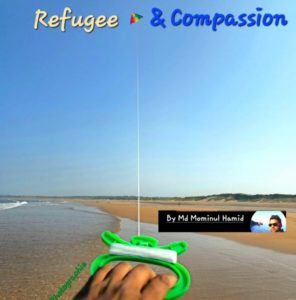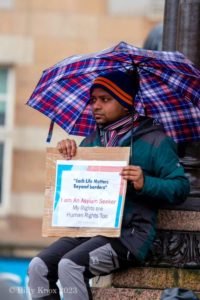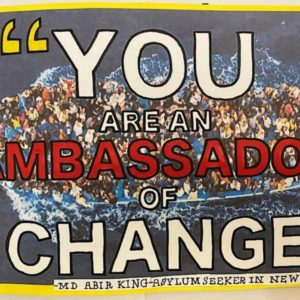By its very nature, a kite represents freedom and the ability to rise above. The refugee kite embodies the journey of displaced individuals displaced from their homes due to conflict, persecution, or other adversities. Just as a kite soar against the wind, refugees face countless challenges on their journey to seek safety and a new beginning. The kite becomes a visual metaphor for their resilience, determination, and hope for a brighter future.
In a world where borders often separate individuals and communities, a symbol of resilience and hope transcends these boundaries – the refugee kite. Like a bird taking flight, the refugee kite carries with its stories of courage, dreams for a better future, and the indomitable spirit of those forced to flee their homes and here for a reason.
In this blog, we will explore the significance of the refugee kite and how it symbolises unity, advocacy & empowerment, and a poem.
In recent years, the plight of refugees and asylum seekers has captured global attention. The United Kingdom, like many other countries, faces its own challenges in addressing the needs of those seeking refuge within its borders. Today, I want to explore the underpinning desires of refugees and asylum seekers and the public view on compassionate grounds for these individuals in the UK. Amidst the complex debates and policies, it is crucial to recognise the importance of empathy and compassion in addressing this humanitarian crisis.
Understanding the UK Asylum Seeker Situation:
The United Kingdom has long been a destination for those fleeing conflict, persecution, and oppression. Asylum seekers arrive in search of safety and a chance to rebuild their lives. However, the UK’s asylum process can be complex and challenging, leaving many individuals in limbo for extended periods. The system requires careful navigation and often requires applicants to prove their need for protection.
Compassion
Compassion is a deep understanding of others’ suffering and a desire to alleviate it through empathy, kindness, and action. Sharing compassion has no limit and it reflects the actual you and who you are for humankind.
But do we really put compassion on the ground and ask any refugees and asylum seekers what they think about ‘Compassion’, what they understand about it, and what their desire is around it? and how it can be reciprocal to share throughout their journey.
The idea of compassion was suggested last year at our Refugee Week UK Advisory Panel meeting (I am a part of the advisory board of Refugee Week UK). I thoroughly supported it, and I felt the need for ‘Compassion’ at this hard time when there is a lot of negativity towards asylum seekers like me. I have an extensive experience in this journey by waiting for 5 and half years for my decision and living in limbo. One thing which drives me to live as I inherit compassion was passed in my life by many in my community, my university, my Inner Temple, my mentors, my tutors, organisations who helped me in my journey, my friends, my well-wishers, my grandmother, my family and especially my beloved mom.
In my own journey, I have been braced by the compassion of many others around me. My best friend Simon Cronin (Who recently passed away) gave me the realisation of compassion when I was recused of my exploiters (Modern Slavery and trafficking) and kept me in his home for 3 months to recover the lifelong trauma I inherited from the horrible incident in my life.
Since childhood, I have inherited a motion of compassion from my mother, who was a school headteacher. She showed me how to love people and stand by them in their needs. This is why her last word to me was Son, ‘Be there for your people and be there for your community, and something good will happen in return’.
I have then tried to share that through my “Mds Little Help Food Bank’ by delivering food parcels during covid 19, ‘Md’s Little Help Dinner Club’ by arranging dinners for local asylum seekers with locals and making connections, Working for Fire services, vaccine volunteers, Citizens Advice, Serving my cohorts at University and running a Society for Sanctuary scholars at my University.
I wish our policymakers would understand it in more depth and the people who sometimes blame us that ‘They are taking away everything from us’. I understand that some people express empathy and understanding, recognising the necessity to extend compassion to those in need.
I think Compassion has many elements, including humbleness, care, sharing, thinking about someone good, passing the good vibes, inspiring them, listening to their stories and being their friend and sharing good values.
But this year Refugee Week, I would like to pass this message to everyone that we should advocate for:
- Fair and efficient processes that prioritise the safety and well-being of asylum seekers ‘A safe passage’.
- Challenges the concerns about the strain on resources or holds misconceptions about the motivations (why people seek asylum) of those seeking refuge.
- Engage in informed dialogue and challenge stereotypes, fostering a society that values compassion and empathy.
- Reflect on the achievement, acknowledge the contribution of the refugees in our community, and let them know “Seeking refuge is not a crime”.
- Let them integrate into society and invite them to socials.
So, to implement this advocacy, we can use the “refugee kite” as a metaphor. This advocacy kite will bring empowerment to the refugees and will integrate into the desires of refugees to be welcomed where they seek refuge. Let’s fly the ‘Kite of Compassion’ and show everyone (including the policymakers) a society where we welcome everyone and say – Let’s work and share compassion & empathy together.
The Underpinning Desires of Refugees and Asylum Seekers:
Refugees and asylum seekers share a common desire for safety, stability, and the opportunity to live a life free from fear. They are mothers, fathers, children, and grandparents who have been uprooted from their homes due to circumstances beyond their control. These individuals hope to find solace, a fresh start, and the chance to contribute to society. Recognising their resilience, courage, and inherent human rights in the face of adversity is essential.
I have tried to write a short poem; I hope you will like it-
Md’s Kite of Refugee (The Poem)
The vast area of my sky is so blue,
My kite takes flight, searching for a new Refuge.
Its journey guided by winds unfamiliar,
I was looking for a land where compassion is shown.
The refugee kite flies with dreams in its wake,
I hope to hold tight through every hardship I face.
The desire for safety, a longing for compassion,
I try to find a place where all sorrows and my trauma can end.
With each gust, the kite’s resilience shines,
A testament to the strength of advocacy in challenging times.
In the land it lands, will there be open arms for me?
A haven of compassion I wish I could find.
Let us not forget; I have been through a lot in my life,
Some of my stories are untold, and I have lost many things already.
Will you share empathy and compassion to guide me,
To help heal the wounds that hardship entails.
(Md Mominul Hamid)
The plight of refugees and asylum seekers cannot be ignored, and the United Kingdom faces its own challenges in addressing their needs. By understanding the underpinning desires of those seeking refuge, we can foster a society that upholds empathy, compassion, and human rights. Let us rise above political discourse and strive to create a world where the refugee kite finds the compassion it seeks, soaring high with hope for a brighter future.
**My world is very small and I want to expand it with your compassionate blessings. Can I beg for some compassion from all of you?**
Please keep me in your blessings.
Writer- MD Mominul Hamid (An aspiring Barrister (Law Student), Asylum seeker and victim of Modern slavery and trafficking in the UK). Visit his personal blog- www.abirking.com.





